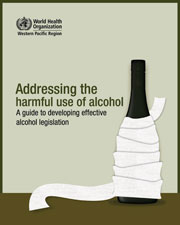
Scientific review of linkages between alcohol, TB and HIV/AIDS
An international group of experts have concluded on the current knowledge base on possible linkages between alcohol and infectious diseases like tuberculoses and HIV/AIDS. Their conclusions are now summarized in an editorial in the international scientific journal Addiction.
The editorial in Addiction (Volume 104, Issue 3, 2009) is written by the four renowned alcohol experts Charles Perry, Jürgen Rehm, Vladimir Poznyak and Robin Room. They start by referring to the fact that alcohol has been identified as a major risk factor for chronic disease and injury, but no infectious disease has been included in the list of alcohol attributable disease categories. This is in spite of the fact that several such diseases have consistent associations with alcohol.
After reviewing available material, the group of experts concluded that
- there is conclusive evidence of a causal linkage between heavy drinking and the incidence of active tuberculoses (TB);
- heavy drinking and alcohol use disorders are also linked causally to worsening of the disease course for both TB and HIV;
- while alcohol usage is associated consistently with the prevalence and incidence of HIV, further research is needed to substantiate causality.
The international expert group met in Cape Town in July 2008 and 25 iexperts from various disciplines and eight countries were present; Australia, Brazil, Canada, China, South Africa, Tanzania, Thailand and the United States. The meeting, which was hosted by the South African Medical Research Council, also had representatives of the World Health Organization (WHO) and UNAIDS. Over four days the participants reviewed data from published and unpublished studies, meta-analyses and other reviews that were prepared specifically for the meeting, as well as information on biological pathways in order to understand more clearly the linkages between alcohol and HIV and TB.
Heavy alcohol use and alcohol use disorders (AUD) have long been associated with active tuberculoses. A recent meta-analysis found a threefold increase risk of active TB for consumption of more than 40 grams of alcohol a day or AUD. The causal pathways between heavy consumption and incidence of active TB are both biological and social, say the experts. Regarding the biological pathways, heavy use of alcohol has an impact on multiple organs and systems, including the weakening of the immune system, and thus facilitates the transition to active TB and worsens the disease course. The second important causal pathway is via social–behavioural consequences of heavy alcohol use and/or alcohol dependence.
Heavy drinking has also been shown to disrupt drinkers from seeking medical attention and decrease their adherence to therapeutic schedules. As a result, treatment outcomes for heavy users of alcohol are worse, even after controlling for factors like homelessness and unemployment. Similar causal pathways for TB were identified between alcohol use and worsening the course of the HIV disease. Again, compromised immunity and the impact of heavy alcohol use on treatment adherence, including regular intake of medication, play a crucial role.
In the course of their proceedings the experts set out clear criteria for causality to be met, based on common epidemiological standards. Based on the existing scientific data the experts could not conclude that there is a causal relationship between drinking and the risk of contracting HIV. Alcohol use is, however, consistently associated with the prevalence and incidence of HIV.
Regarding a potential impact of alcohol on infection with HIV, the experts therefore concluded that ‘the relationship between alcohol use and risky sex is complex, reflecting multiple underlying causal and non-causal processes’. There is a need to answer a number of questions about the potential links, such as: ‘Do people with whom heavy drinkers have sex differ from the partners of people who do not drink heavily?’; ‘Are heavy drinkers more likely to have multiple concurrent partners than people who are not heavy drinkers?; and ‘Are condoms applied less correctly after heavy drinking than otherwise?’. This will require both a re-analysis of already available data as well as new, longitudinal studies to be carried out, according to the expert meeting.
In their conclusion of the article in Addiction the alcohol experts say that linking alcohol-related interventions to infectious disease control programs will be a major challenge of the next years.
![]()
![]()
Developed with CustomPublish CMS by Nettinfo AS


